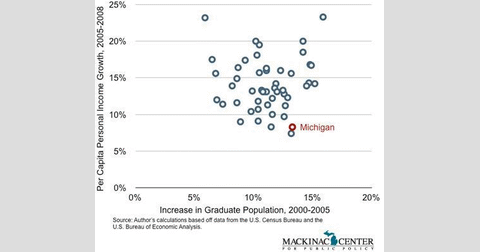High-Priced Bus Drivers In Lansing
CATA has 69 drivers making over $60K
The Lansing bus authority had 69 drivers who made $60,000 or more in 2012, including one who earned $104,411.
The Capital Area Transportation Authority had 236 bus drivers in 2012, many of which were part time. Salaries ranged from under $1,000, to 34 bus drivers who made more than $70,000, according to information obtained from a Freedom of Information Act request. The salaries include overtime.
In recent years, customer bus fares have covered only about 15 percent of the system's total operating costs.
“CATA has the lowest cost per passenger ($2.37) of any transit system in the state of Michigan. An operator’s pay is just one component of actual cost,” said Laurie Robison, the director of marketing for the Capital Area Transportation Authority. “There is no ‘annual salary’ for our bus operators as they are paid on an hourly basis. Their ‘annual pay’ is based on how many hours each operator actually works in a year.”
By comparison, the average salary of an associate professor at Ferris State was $71,900 while an assistant professor earned $64,500 in 2012, according to the Chronicle of Higher Education.
“Everything about mass transit is grossly overpriced,” said Leon Drolet, chairman of the Michigan Taxpayers Alliance. “That’s one reason there is a lot of skeptics with mass transit. It’s not about getting people around, it’s about spending government money.”
Jeff Steinport, who helped found citizen taxpayers watchdog group in Kent County, has investigated transit spending in Michigan. He said he wasn’t surprised more than 30 CATA drivers made $70,000 or more.
“Regional transit agencies are unaccountable,” Steinport said. “They do not have elected leadership yet they are able to raise taxes. ... Regional transit agencies are undemocratic and consequently, they are insulated from the consequences of making poor financial decisions. No one is held accountable when the system is wasting taxpayer money. We believe that regional transit agency boards should be elected, like every other government entity in the state that is able to raise property taxes. Further, unlike school districts, transit agencies have no mandated transparency."
CATA served 11.8 million passengers in 2011, according to the Michigan Department of Transportation. The agency's 145 buses served about 223 passengers per day, according to MDOT.
When factoring in inflation, CATA’s drivers’ labor costs have increased from $2.6 million in 2003-04 to an anticipated $4 million in 2012-13, while drivers’ benefits have jumped from $1.2 million in 2003-04 to an anticipated $2 million in 2012-13.
Michigan Capitol Confidential is the news source produced by the Mackinac Center for Public Policy. Michigan Capitol Confidential reports with a free-market news perspective.


 Michigan economic development agency gives former member $202M in grants
Michigan economic development agency gives former member $202M in grants
 Caregivers protest union effort to skim home helpers’ pay
Caregivers protest union effort to skim home helpers’ pay
 Bills to end merit pay, paycheck protection for Michigan teachers head to Whitmer’s desk
Bills to end merit pay, paycheck protection for Michigan teachers head to Whitmer’s desk

 Michigan higher education policy is out of wack — here’s how to improve it
Michigan higher education policy is out of wack — here’s how to improve it
 Michigan manages to lose students while hiking higher ed spending
Michigan manages to lose students while hiking higher ed spending
 There is no such thing as ‘the state’s dime’
There is no such thing as ‘the state’s dime’